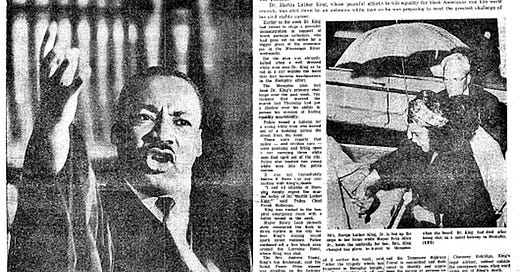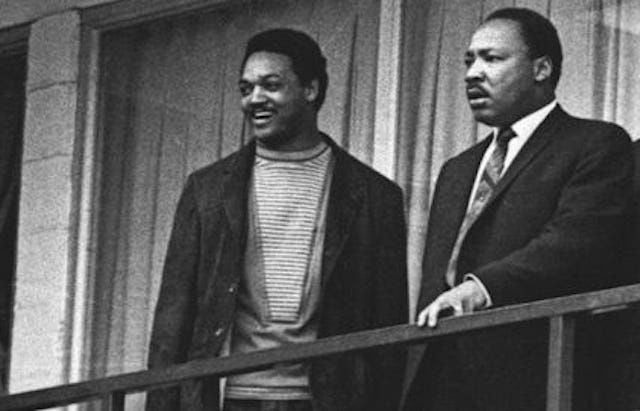King Did Not Simply Die, He Was Murdered
How we talk about the end of King's life matters to his memory and the struggle for justice.
I have so many ideas for how to make history real and relevant to you—articles like this are a prime example. But I need your help. Would you consider becoming a paid subscriber today?
I recently met a living legend of the Civil Rights movement. Jesse L. Jackson was visiting my new home base of Louisville, Kentucky for a memorial ceremony for his friend, Rev. Dr. Martin Luther King, Jr.
To be in the room with a man who has dedicated decades to civil rights, justice, and equity is an unforgettable moment.
To be in the room with a man who was with Dr. King on his last day on April 4, 1968 was also sobering reminder of the penalty for pursuing human dignity in this country.
I cannot begin to fathom the trauma of that moment. Nor can I imagine what it is like to have so many people fail to remember the violence of it all.
So many people (including me at times) have thoughtlessly said Martin Luther King, Jr. “died.”
He did not simply die. He was murdered.
Of course, in the barest of ways, this language is accurate. He did die. But to simply say he died misses more than it reveals.
MLK did not “die” as if from natural causes. He did not live to a good old age and join the ancestors after a long journey on earth. He was specifically targeted for violence because of his beliefs and his activism on behalf of Black people and poor people.
King was the murdered because of white racial violence and terrorism.
It would also be accurate to say that MLK was martyred. A martyr is someone who is persecuted and killed for their beliefs, especially religious beliefs.
Kings’ religious convictions led him to promote the Beloved Community. The racist convictions of the man who murdered King and those who celebrated his death led them to promote the American Nightmare.
One could also say King was assassinated. An assassination is the calculated murder of someone, especially for political reasons.
King opposed the war in Vietnam, criticized the wealth-hoarding that kept some people poor and others wildly rich, and he supported the full humanity and equal rights of Black people.
His commitment to righteousness and public justice made him a target for assassination.
Martin Luther King, Jr. was still a young man when he was murdered, but he had already been paying a price for his commitment to justice. According to one of King’s biographers, “The Movement took a huge toll on him. When they did the autopsy, they said he had the heart of a 60 year old, he's 39.”
I understand that in casual conversation it may be easier to say that King died. But language is important. Words shape how we remember events.
Just as we should not sanitize King’s words or his radical commitment to love, we should not sanitize his murder either.
We have to remember the cost of standing up for racial justice in this country. In a nation built on race-based chattel slavery and white supremacy, confronting the racist status quo can literally get you killed.
Only when we count the cost of committing the to Black freedom struggle and human rights for all can we participate in the legacy that King and so many others sacrificed their lives to achieve.
Martin Luther King, Jr. was murdered. He was martyred. He was assassinated. He did not merely, simply, or peacefully “die.”
What thoughts or feelings does King’s assassination raise for you? Comment below.
\






It may be that casual conversation takes the same road in other countries as you have mentioned it here. But stating, and restating, that he was in fact murdered is also a historical fact and is evidence that remembering history helps, just as learning of it helps. As this day is beginning with a hope and yearning for justice, that fact that is April 4th stands a little taller
I have always stated that Rev. Dr. King was assassinated, and have never thought of it any other way. His assassination has been connected in my mind and consciousness from a relatively early age (in ways that have been more complicated, as I am White), as I was born exactly a year later, April 4, 1969. May God bless Dr. King's memory and bring his (and the prophet Amos') words to fuller reality.